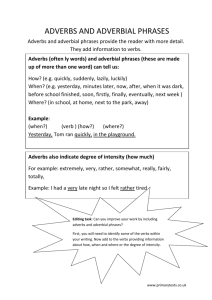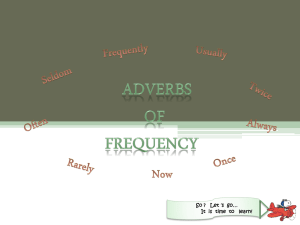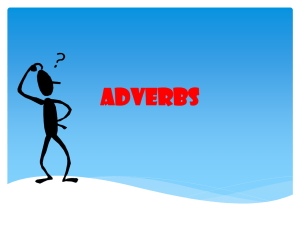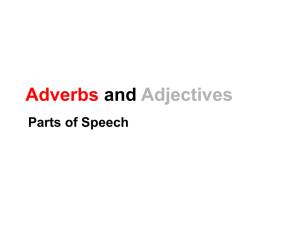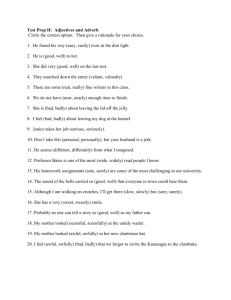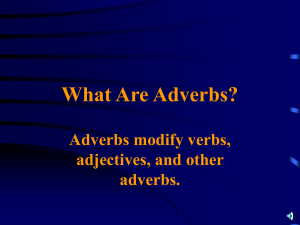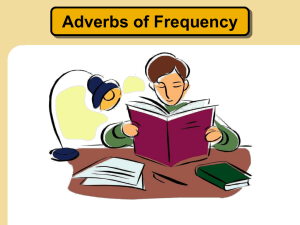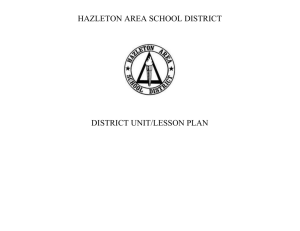NonFiction Analysis
advertisement
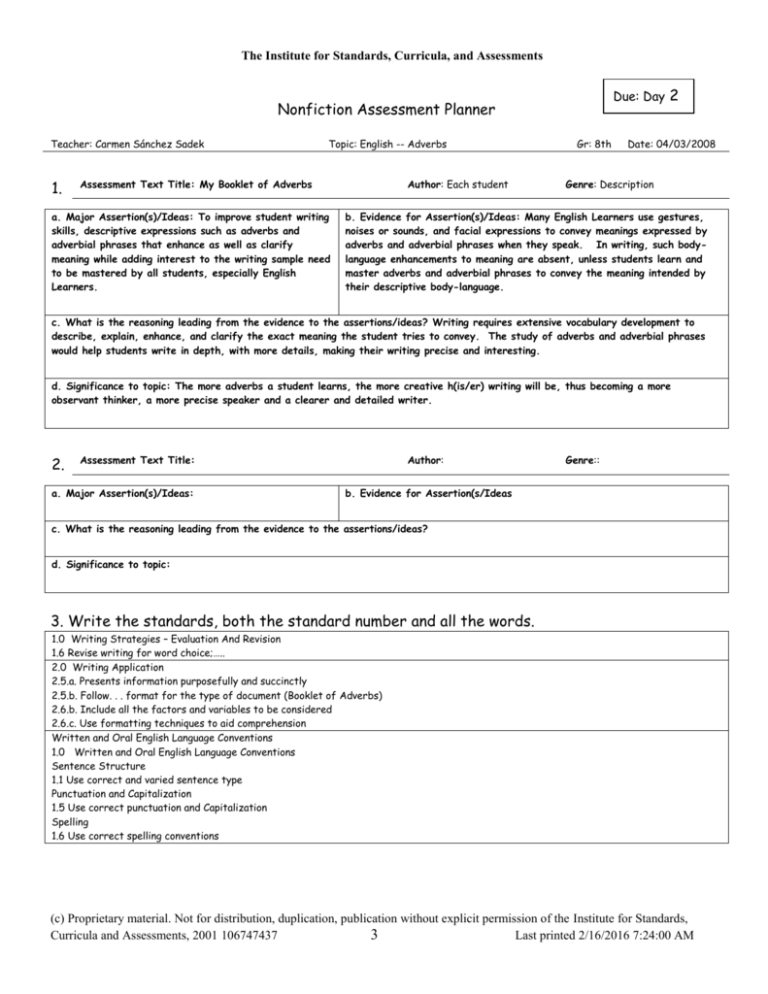
The Institute for Standards, Curricula, and Assessments Due: Day Nonfiction Assessment Planner Teacher: Carmen Sánchez Sadek 1. Topic: English -- Adverbs Assessment Text Title: My Booklet of Adverbs a. Major Assertion(s)/Ideas: To improve student writing skills, descriptive expressions such as adverbs and adverbial phrases that enhance as well as clarify meaning while adding interest to the writing sample need to be mastered by all students, especially English Learners. Author: Each student Gr: 8th 2 Date: 04/03/2008 Genre: Description b. Evidence for Assertion(s)/Ideas: Many English Learners use gestures, noises or sounds, and facial expressions to convey meanings expressed by adverbs and adverbial phrases when they speak. In writing, such bodylanguage enhancements to meaning are absent, unless students learn and master adverbs and adverbial phrases to convey the meaning intended by their descriptive body-language. c. What is the reasoning leading from the evidence to the assertions/ideas? Writing requires extensive vocabulary development to describe, explain, enhance, and clarify the exact meaning the student tries to convey. The study of adverbs and adverbial phrases would help students write in depth, with more details, making their writing precise and interesting. d. Significance to topic: The more adverbs a student learns, the more creative h(is/er) writing will be, thus becoming a more observant thinker, a more precise speaker and a clearer and detailed writer. 2. Assessment Text Title: a. Major Assertion(s)/Ideas: Author: Genre:: b. Evidence for Assertion(s/Ideas c. What is the reasoning leading from the evidence to the assertions/ideas? d. Significance to topic: 3. Write the standards, both the standard number and all the words. 1.0 Writing Strategies – Evaluation And Revision 1.6 Revise writing for word choice;….. 2.0 Writing Application 2.5.a. Presents information purposefully and succinctly 2.5.b. Follow. . . format for the type of document (Booklet of Adverbs) 2.6.b. Include all the factors and variables to be considered 2.6.c. Use formatting techniques to aid comprehension Written and Oral English Language Conventions 1.0 Written and Oral English Language Conventions Sentence Structure 1.1 Use correct and varied sentence type Punctuation and Capitalization 1.5 Use correct punctuation and Capitalization Spelling 1.6 Use correct spelling conventions (c) Proprietary material. Not for distribution, duplication, publication without explicit permission of the Institute for Standards, Curricula and Assessments, 2001 106747437 3 Last printed 2/16/2016 7:24:00 AM The Institute for Standards, Curricula, and Assessments 4. List the major concepts & skills students are to learn from the readings you selected. Concept(s) Vocabulary Technical Vocabulary for Parts of Speech Perception, observation, resulting in accurate, precise, succinct, and purposeful written expression Skill(s) Use adverbs and adverbial phrases in expressing and describing reality with words, phrases and sentences. Recognize and use in writing: actions (Verbs), qualities, (Adjectives) and different classifications of adverbs and adverbial phrases. Derive adverbs from other parts of speech. Write accurate, precise, succinct and purposeful sentences based on the student’s perception and observation of reality. 5. What is the overarching question that captures the major and minor issues of the topic? Can students accurately, precisely and succinctly and purposefully describe pictures using adverbs and adverbial phrases? 6. What are the questions students must answer in order to answer the overarching question? What exactly do I (each student) perceive, see, observe? Can I name everything I see and perceive? (Nouns) Can I express words, phrases, clauses, sentences that describe what I observe accurately, precisely, succinctly, purposefully, and in detail? (Adjectives and Adverbs) Do I recognize and can express adverbs and adverbial phrases? Do I recognize and can express actions (Verbs) and qualities (Adjectives)? Do I know how to use a dictionary and a thesaurus to find derived adverbs from adjectives and from other parts of speech? 7. What concepts and skills should your students have mastered before this unit? Speaking to describe reality. Attention to details in reality. Recognizing nouns, adjectives, verbs. Using a basic dictionary and a thesaurus to find synonyms. 8. Write your End-of-Unit Assessment (EOUA) & Across-Site, On-Demand Assessment (ASODA) question first. Then write in the elements that must be in the prompt. If an element is missing, rewrite the prompt to include the missing element in the prompt. End-of-Unit Assessment (EOUA) The Prompts Re-Done in EOUA Assessment Booklet – Turned in 04/07/08 Purpose of Writing Description of pictures in detail – accurately, precisely, succinctly (c) Proprietary material. Not for distribution, duplication, publication without explicit permission of the Institute for Standards, Curricula and Assessments, 2001 106747437 3 Last printed 2/16/2016 7:24:00 AM The Institute for Standards, Curricula, and Assessments End-of-Unit Assessment (EOUA) (narrative, descriptive, expository, persuasive) and purposefully by using adverbs Genre (e.g.,editorial, Description essay,poem,letter,Pwrpt…) Audience Other students, teacher(s) and parents as well as community Student Pt.of View 3rd person descriptions and, possibly, 1st person descriptions 5 W’s + How Use of adverbs that may express where, when, why, how, to what extent, etc. (1st or 3rd Person) (who, what, where, when, why, how?) Organization Skills (compare/contrast, summarize, explain, analyze, convince…) Describe, explain, and summarize in detail the perceived picture by writing words, phrase and sentences 9. Write your response to you assessment on this form. Share response with partners. Did your prompt assess the concepts and skills you wanted? Yes No By Monday, 4/7/08 10. On chart paper, write the following: 1) topic, 2) team names, 3) grade, 4) standards assessed (key points only), 5) overarching question, 6) genre, 7) assessment, 8) activities that teach the concepts and skills in the assessment. Be ready to make a 3 min. presentation. DONE!!!!!!!!, 4/4/08 11. Design Rubric. See Tab 4 for writing (W) and reading (R) paper templates. Download files from your electronic folder. By Monday, 4/7/08 12. Format your assessment in a student booklet format. See Tab 4 for writing (W) and reading (R) paper templates. Download files from your electronic folder. DONE – turned in 04/07/08 13. Design the assessment score sheet. See Tab 4 for writing (W) and reading (R) paper templates. Download files from your electronic folder. Work in progress (c) Proprietary material. Not for distribution, duplication, publication without explicit permission of the Institute for Standards, Curricula and Assessments, 2001 106747437 3 Last printed 2/16/2016 7:24:00 AM
